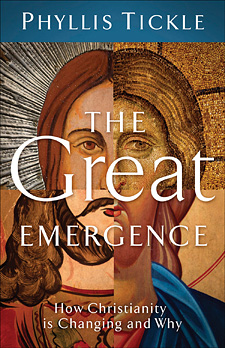 According to author Phyllis Tickle, the contemporary Church stands in the midst of a once-every-500-year re-formation. There have been three such moments before, and each time the church has reorganised itself, lost some shackles, and grown significantly.
According to author Phyllis Tickle, the contemporary Church stands in the midst of a once-every-500-year re-formation. There have been three such moments before, and each time the church has reorganised itself, lost some shackles, and grown significantly.
She suggests that the three previous moments in church history are:
"¢ the rise of the Monastic movement (monasteries and the like) in the 500's,
"¢ the split between the east and west branches of the church near 1000AD and
"¢ the Protestant Reformation of the 1500s.
In each of these occasions, Tickle suggests there are three things that get challenged roughly every five hundred years: what has authority for Christians? What does it mean to be human? What is Christianity's relationship to other religions/branches of Christianity?
So, for example, in the Reformation, authority changed from the Pope to Scripture wih the rise of Protestantism; all humans were recognised by Luther as priests; and there was a distinction made with Catholicism, and Judaism, by Luther. The result of these movements is a reaction against the hierarchy of the church, and a new form of church emerges.
If the pattern is to continue, we're now due for the next revolution, which Tickle calls The Great Emergence. However, she is unclear about what that means. Tickle talks vaguely about emergents, but does not define who they are; but she does refer to John Wimber, Brian McLaren, Don Miller and others as part of the movement.
What she does do is an analysis of the last 500 years suggesting that the basis of authority, that is, Scripture is being challenged; that the development of psychology has changed our ideas of what it means to be human; and that other religions have influenced the theory and practice of Christianity.
It is unclear what she thinks this new form of Christianity or church will be, but she suggests there is a movement toward what she calls the "gathering centre"; which combines the practices and beliefs of those who emphasise liturgy, those who emphasise the Bible, those who emphasise social justice and those who emphasise the Holy Spirit. In keeping with her earlier comments, there will be a movement away from church hierarchies and an empowering of the laity.
Much of Tickle's thesis revolves around the question of the authority of the Bible, and especially about how that authority has been eroded: firstly by science, and then by the impact of culture. In terms of the latter she says the first step was the US civil war (where both sides claimed that the Bible justified their position on slavery), then the acknowledgment of divorce, the rise of women to ministry, and the acceptance of homosexuality in the church.
Tickle sees authority in emerging churches as being based on three things: community and the Holy Spirit, alongside the Bible.
This book appealed to me because of its big ideas. It raises important questions, and I think the concept of church structures being shaken up is something to note: are the structures we create a work of God or humans? I think also Tickle is trying to find an historical legitimacy for the emerging church. However, what she actually does is paint a vivid picture of an emerging culture.
Unfortunately, there are many weaknesses with this book:
"¢ There are broad statements, but little evidence. For example she says that a quarter of emergents are Roman Catholics, with no evidence. She also suggests that when the Great Emergence reaches maturity 60% of Christians will be emergent, but again there is no analysis provided to back up such a statement.
"¢ She is totally North American-centric, ignoring trends around the world; including the stark factor that the fastest growing churches, in Africa and China, are those which fundamentally recognise the authority of the Bible, and reject the notion of a "gathering centre".
"¢ She is perhaps just promoting the agenda of the Episcopalian church in America, of which she is a lay minister. Some have seen this as a rehashing of liberal, postmodern theology. For example she has a concept of orthonomy, ‘right beauty’ and gives as an example that "...for the emergent, the Virgin birth is so beautiful that it has to be true, whether it actually happened or not." (p.149)
The danger is that this book is seen as defining the emerging church movement, when many Christian emergent communities, especially those in Australia, are actually looking to go "back" to the Bible, including the patterns of the early church, and are seeking to engage with the emerging culture, rather than causing a new form of church to emerge.






















